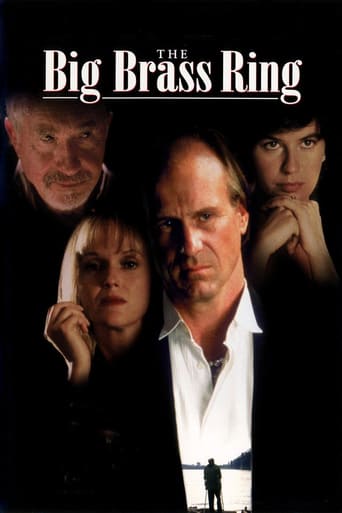

Why do a film from an Orson Welles' script and then change it so much that it might as well be a regular bad film only it now looks worse, if that's possible, because it will be compared to Welles real films. Nothing about it feels like Welles so what was it they found in the material that made them excited about making a film of it. It doesn't hold a candle to any "real" Welles film on any level. William Hurt and the rest of the cast seem to have been encouraged to make as little of every scene as possible. Boring, listless, pointless film that should earn it's writer and director special places in hell for blowing the opportunity for a famously un-produced script to get made.
... View MoreWhat a sleeper!! No one I know heard of this, and I wasn't aware that it was reviewed in the New Yorker (though it may have been; I haven't been paying attention...). I think it was in the trailers of The End of Sexual Innocence or Pi that I learned of it. How could such an excellent film have been overlooked so grievously? All the actors are brilliant and very well played. The plot is credible and diabolical. The twists and serpentines of it require attention. (Maybe that's why it was a box-office non-starter...) The whole enterprise is intelligent, provocative, emotionally wrenching, and thoroughly enjoyable. It has a completely ambiguous premise which is titillating to those with any imagination -- which (no, I can't say that, it's a spoiler!)...anyway, suffice it to say that you won't fall asleep.
... View MoreI never knew running for governor was so leisurely. Plenty of time for extra curricular activities...The movie was interesting but confusing. I like a little mystery in my movies, but it was tough to keep all the balding white guys with multiple names straight -- especially in the flashbacks.However, CNN correspondent Christiane Amanpour (Irène Jacob) never looked so good.
... View MoreThis is a murky story of politics, scandal, sex and deception. Sounds like it should have been a great film, but it wasn't. The basic plot was sound as we might expect from Orson Welles. But the way it was presented was too disjointed and abstruse. Without reading the original script, it is hard to tell if the responsibility for this lies with Welles, Oja Kodar (who did the adaptation) or George Hickenlooper, the director. I suspect it is the latter two.The biggest problem I had was character development. By the end of the film one should reasonably expect the pieces to fit together. Good character development should give us insight into the characters' motivation. I found this lacking. The flashbacks didn't really help us to understand the motivations of the characters as much as they should have. It seems that the brothers voluntarily switched identities, since Billy was wearing a name tag that said "Romero" on his uniform when he left to go to war. So, Blake really didn't steal his brother's identity as it appeared. This wasn't made very clear.There were lots of loose ends here. What motivated the limo driver to do what he did? Was it a need to be close to power, or some personal vendetta? Who knows?From a directorial and cinematography point of view, the film was far too dark, that is, underexposed. I'm certain they were trying for that look, but it made the photography look as if it were shot on 30 year old film of poor quality. Also, the audio was very bad. It was very difficult understanding a lot of the dialogue.William Hurt was miscast in this role. For certain films, his puling, self tortured style of delivery are appropriate to the character (Big Chill, Broadcast News, Children of a Lesser God). However, in this film his character required a more dynamic and confident portrayal, which he was unable to deliver.Nigel Hawthorne gave the best performance as Kim Mennaker, the Senator who brought the boys up. His ability to portray the old political warhorse, seduced by the trappings of power was excellent.Irene Jacob gave a good performance as Cela, the reporter with an obsession for the candidate and the truth behind him.Overall, the whole was less than the sum of the parts. The presentation was ponderous and uneven and the direction mediocre at best. Worth a 5/10. If you are looking for political campaign stories, there are better choices (Primary Colors, The Candidate, with Robert Redford).
... View More